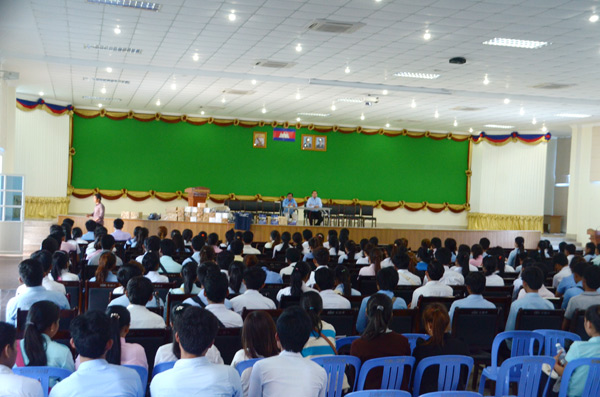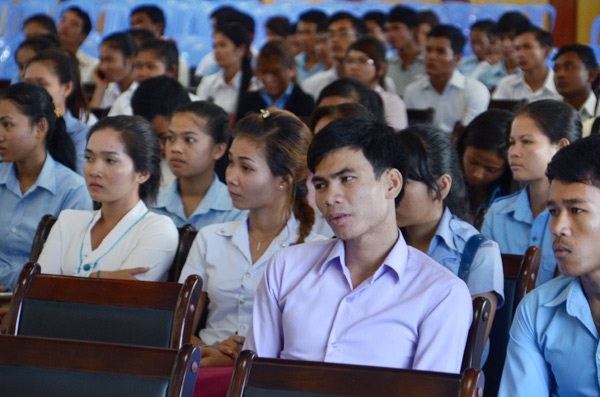Our Public Affairs Intern Thomas Stevenson reports on a recent outreach lecture for university students in Cambodia's southernmost province.
On Friday, I had the opportunity to accompany public affairs staff on an outreach trip to Svay Rieng University. A few hundred students, aged 18-22, had turned out for our presentation. While ECCC spokesperson Pheaktra Neth addressed the audience, I stepped aside to talk with the event’s organizer, Mr. Hem Suntrak Wadh.
The thirty-four year old teaches intermediate English at Svay Rieng. Born the year the Khmer Rouge fell from power in Cambodia, he has felt the impact of the regime all his life. Mr. Hem never had the chance to meet six members of his extended family, for example, who perished in the rice fields and labor camps. He says his mother used to talk about the Khmer Rouge, wanting him to understand the circumstances that preceded his birth.

Mr. Hem Suntrak Wadh. Photo: ECCC/Thomas Stevenson
Since coming to Cambodia a few months ago, I have gotten the sense that not all families are so open about their experience during the Democratic Kampuchea era. I asked whether his students learn about the events of 1975-9 in school. Mr. Hem says the freshman year curriculum includes a semester on this period of history, and he believes the classroom version is faithful to events. Even so, some students remain skeptical. “I remember a girl,” Mr. Hem says, “who used to ask me, ‘Is this true or not?’
Troubled that his students did not grasp the reality of life under the Khmer Rouge, Mr. Hem began to look for ways to supplement the lessons. He had heard on TV and radio that it was possible to visit the ECCC, Choeung Ek “killing fields” and S-21 detention facility as part of a court-sponsored “study tour.” Accordingly, he arranged two visits, bringing a group of students each time. On one trip, the skeptical girl observed part of the trial of the former S-21 head known as “Duch.” “I guess it is true,” she said afterward.
Mr. Hem tells me he “absolutely supports” the work of the ECCC, which stands as a testament to an almost-incredibly gruesome part of Cambodian history. “[The young people] have to understand,” he says.
My interviews with three Svay Rieng students will appear in the June edition of the court report.

Students at Svay Rieng University listen to ECCC Press Officer Mr. Neth Pheaktra. Photo: ECCC/Thomas Stevenson

Students at Svay Rieng University attend an ECCC lecture on 17 May 2013. Photo: ECCC/Thomas Stevenson